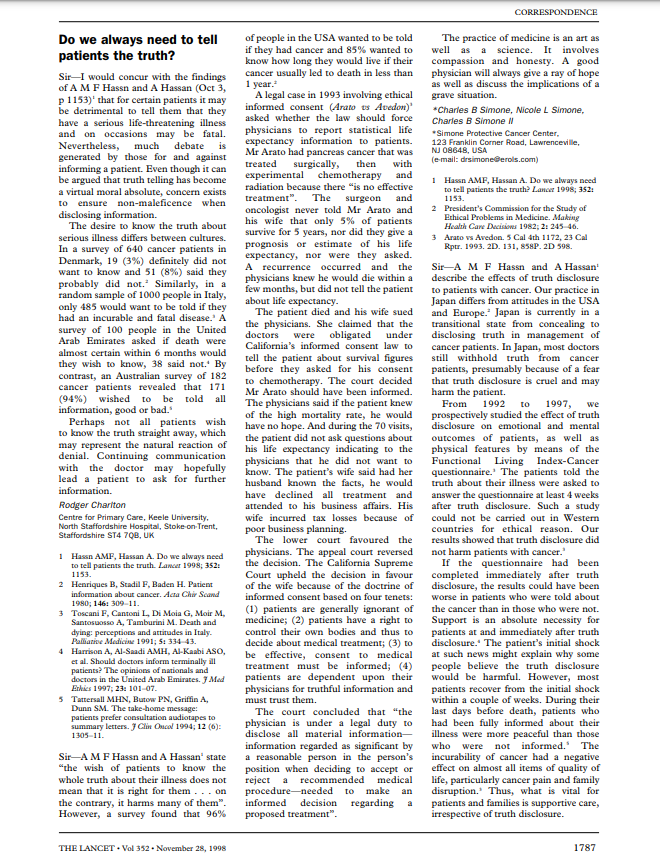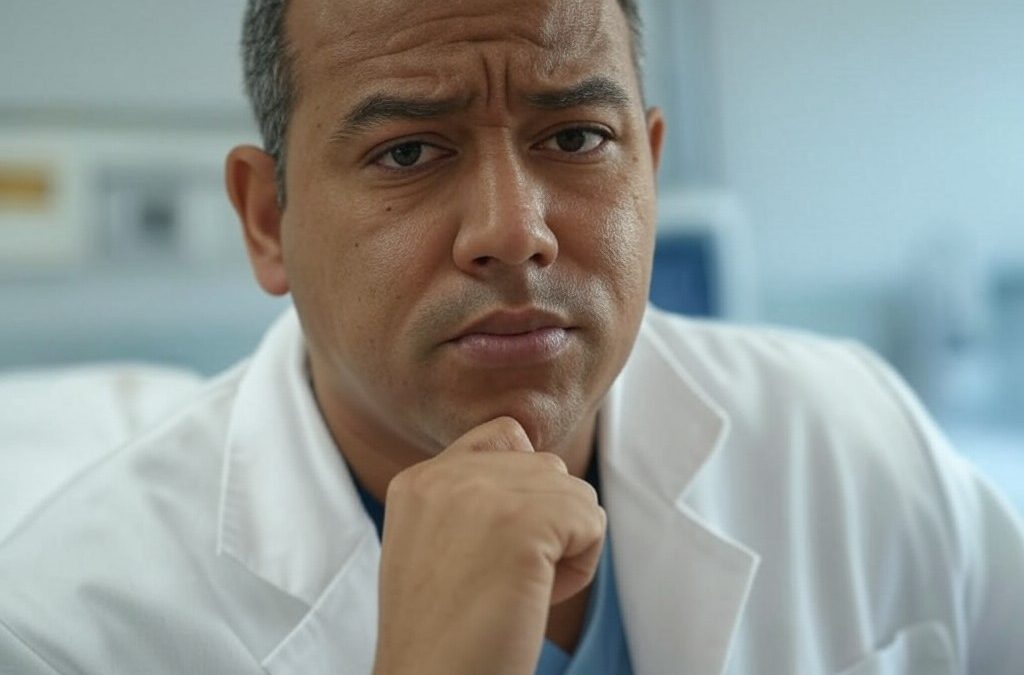1/2/17
We do not diagnose disease or recommend a dietary supplement for the treatment of disease. You should share this information with your physician who can determine what nutrition, disease and injury treatment regimen is best for you. You can search this site or the web for topics of interest that I may have written (use Dr Simone and topic).
“We provide truthful information without emotion or influence from the medical establishment, pharmaceutical industry, national organizations, special interest groups or government agencies.” Charles B Simone, M.MS., M.D.
LIES IN MEDICINE
Lawrenceville, NJ (Dr Simone) – The following are some lies that are sometimes told in medicine – excerpted from Chapter 21 Quality of Life and Ethics, in Cancer and Nutrition by Charles B Simone, M.D. The case discussed below will outline these lies.
(1) “I got it all”
This sentence is a lie virtually always because by the time most carcinomas are detected, some of the cancer cells have already spread to other parts of the body and there are also micro metastases that remain even though the “margins are clear.” The surgeon could say: ‘I got all the tumor that I could see.’
(2) Lies of Omission
(3) “We will try it” – even though the physician knows statistically it won’t work
(4) “You, the patient, decide” – this is perhaps the most absurd sentence heard by a patient who is generally ignorant of medicine and could not possibly have the medical judgement necessary to weigh the options without proper informed consent.

A legal case involving ethical informed consent (Arato v. Avedon) asked whether the law should force physicians to report statistical life expectancy information to patients. Mr. Arato had pancreas cancer that was treated surgically, then with experimental chemotherapy and radiation because there “is no effective treatment” ( “We will try it” ). The surgeon and oncologist never told Mr. Arato and his wife that only 5% survive for 5 years, nor did they give a prognosis or estimate of his life expectancy, nor were they asked (Lies of Omission). A recurrence occurred and the physicians knew he would die within a few months, but did not tell the patient about life expectancy (Lies of Omission).
The patient died and his wife sued the physicians claiming that the doctors were obligated under California’s informed consent law to tell the patient about survival figures before asking him to consent to chemotherapy. The court decided Mr. Arato should have been informed. The physicians said if the patient knew of the high mortality rate, he would have no hope. And during the 70 visits, the patient did not ask questions about his life expectancy indicating to the physicians that he did not want to know. The patient’s wife said had the patient known the facts, he would have declined all treatment and attended to his business affairs. His wife incurred tax losses due to poor business planning.
The lower court favored the physicians. The appeal court reversed the decision. The California Supreme Court upheld the decision in favor of the wife because of the doctrine of informed consent based on four tenets:
1. Patients are generally ignorant of medicine (“You, the patient, decide”).
2. Patients have a right to control their own bodies and thus to decide about medical treatment.
3. To be effective, consent to medical treatment must be informed.
4. Patients are dependent upon their physicians for truthful information and must trust them (making the doctor-patient relationship a “fiduciary” or trust relationship rather that an arm’s length business relationship).
The court concluded “the physician is under a legal duty to disclose all material information – information regarded as significant by a reasonable person in the person’s position when deciding to accept or reject a recommended medical procedure – needed to make an informed decision regarding a proposed treatment.”
The practice of medicine is an art as well as a science. It involves compassion and honesty. A good physician will always give a ray of hope as well as discuss the implications of a grave situation.
It is often easier to give another round of ineffective chemotherapy than to tell patients that there is nothing left in the anti-cancer arsenal. The clinician should sit with patients and families, hold their hands and tell them there is no way to control their cancer, but they will not be abandoned and will be made as comfortable as possible.
Physicians are required to tell the patient about the probability that a proposed treatment will be successful and specifically define what the word “successful” means. A reasonable person should understand the probability of success from a particular treatment and then decide whether to accept that treatment or not. We must tell patients of clinical trials but inform them that clinical trials generally do not improve the outcome. The poor results with conventional medicine are, of course, the whole basis for the ground swell concerning alternative medicine in the United States. Our culture emphasizes life and youth and vitality. We tend to shy away from talking about death and dying. Hope should always be given, but not false hope. We must inform patients of studies regarding particular treatments and life expectancy and/or benefits from those treatments.
Sometimes there are financial conflicts that arise when one treatment is considered over another treatment. It has been said that the chief beneficiaries of cancer treatments that don’t change survival and cause harm are often the oncology community and pharmaceutical companies and their stockholders.23
We really need to start thinking in terms of EFFECTIVE or NONEFFECTIVE treatment and tell patients about treatments in those terms. For instance, chemotherapy is noneffective for pancreas cancer. And perhaps, as I have said in the past, aggressive treatment to keep a person alive in the last several weeks of his or her life would stop if the patient and the family were truly informed about the futility of such efforts. The costs of health care provided to a patient in terminal stages in a hospital are enormous and consume anywhere from 20 to 30 percent of all the health-care dollars. The patient and the family may be responsible for this because they “want everything done.” The physician is partly responsible because “our technology should help these patients.” And the legal profession may, in part, be responsible as well; if everything is not done, will the family sue the physician?
(c) 2017 Charles B. Simone, M.MS., M.D.




